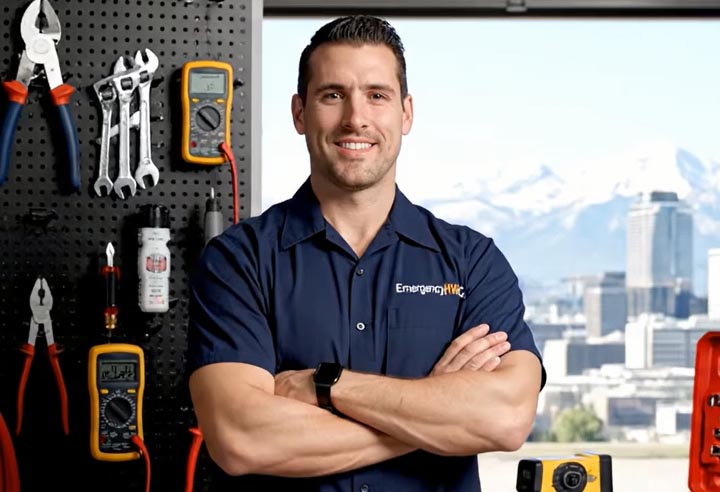Our EmergencyHVACs team believes in complete transparency and clear communication. Below, you’ll find answers to the questions we hear most often about our heating, cooling, emergency repair, and indoor air quality referral services.
Still have questions? Contact us today to get the answers you need.
Heating
Basements often experience unique heating challenges due to their below-grade location and natural heat flow patterns. Solutions include:
- Installing separate heating zones for the basement
- Implementing proper insulation strategies
- Using supplemental heating sources when necessary
- Ensuring adequate return air vents for proper circulation
- Energy Efficiency and Cost Concerns
Choose a furnace if you want fast, reliable heat during Denver’s coldest winters, especially if your home already has ductwork and you prefer lower upfront costs. Modern gas furnaces offer high efficiency (up to 98% AFUE) and are well-suited for Colorado’s temperature swings.
Opt for a heat pump—specifically a cold-climate model—if you want both heating and cooling in one system, lower carbon emissions, and potential energy savings.
Heat pumps are highly efficient and work well in Denver’s climate, but may need a backup heat source for extreme cold snaps. Always consult a local HVAC pro to assess your home’s insulation, existing systems, and energy goals
Geothermal heating offers unmatched energy efficiency, reducing heating costs by up to 70% and cooling costs by up to 50% in Colorado’s climate. It provides consistent comfort year-round, works reliably even during harsh winters, and has a very low carbon footprint.
While installation costs are higher, federal tax credits and rebates can offset expenses, and the payback period can be as short as 2–5 years (if replacing propane). Geothermal systems are durable, require minimal maintenance, and add long-term value to your home
- Efficiency: Both can be highly efficient (90%+ AFUE), but condensing boilers may edge out furnaces at the top end.
- Comfort: Boilers provide even, radiant heat (great for steady warmth), while furnaces deliver quick, forced-air heating.
- Air Quality: Boilers don’t circulate dust/allergens; furnaces require regular filter changes.
- Installation: Furnaces are less expensive if ductwork exists; boilers cost more, especially for retrofits.
- Maintenance: Furnaces need frequent filter changes; boilers require water quality checks.
- Home location: Furnaces are common in Denver/urban areas; boilers are preferred in mountain/rural homes for consistent heat.
- Budget and rebates: Consider upfront costs, available rebates, and long-term energy savings
Heating system options and efficiency requirements vary significantly by state due to:
- Political factors influencing energy efficiency policies
- State-specific building codes and regulations
- Local climate conditions and energy needs
- Available incentives and rebates for energy-efficient systems
Heat pumps can face efficiency challenges in extremely cold climates, particularly when temperatures drop below freezing. This is because they need to work harder to extract heat from the cold outside air. To address this:
- Consider installing a dual-fuel system that combines a heat pump with a backup furnace
- Ensure proper sizing and installation for cold climate conditions
- Regular maintenance to maintain optimal performance in harsh conditions

